Gambling
Senators call for sports gambling antitrust probe

Senators Mike Lee and Peter Welch have asked the US antitrust agencies to investigate whether FanDuel and DraftKings are illegally teaming up to exclude rival fantasy sports and sports gambling platforms.
In a letter to the Federal Trade Commission and the Department of Justice on Friday, both senators called for an investigation into “concerning reports” that FanDuel and DraftKings are coordinating efforts to prevent smaller competitors from reaching deals with sports leagues, payment processors and marketing companies.
FanDuel and DraftKings had their proposed merger-to-monopoly scuttled by the FTC in 2017 but they are now arguably acting like “one company”, the senators said.
“They should not be able to accomplish through collusion what was prevented through acquisition,” Lee and Welch said.
DraftKings and FanDuel revealed plans to merge in 2016, but the FTC and attorneys general for California and Washington, DC, sued to block the deal, claiming it would create a near-monopoly for daily fantasy sports competition in the US.
The companies called the deal off a month after the FTC filed its administrative challenge.
However, Lee and Welch claim FanDuel and DraftKings are aligning their efforts by interfering with competitors’ relationships with key partners in the industry, preventing them from raising capital and expanding their reach.
“Even modest obstruction in these negotiations can delay entry and expansion,” the lawmakers said.
The senators asked FTC Chair Lina Khan and Antitrust Division head Jonathan Kanter to use any investigative or enforcement authorities necessary to investigate the potential misconduct, noting that protecting consumers is especially important in an industry with a risk of addiction.
The Unlawful Internet Gambling Enforcement Act of 2006 banned most forms of online betting but it allowed a carve out for certain skill-based fantasy sports contests so long as monetary awards were set in advance and not determined by the number of players.
DraftKings and FanDuel quickly emerged as leaders in this market, but according to an article cited by Lee and Welch, casinos succeeded in convincing many regulators that daily fantasy games were illegal.
The author of that article, Temple University Law professor Salil Mehra, said that FanDuel and DraftKings have since co-opted the casinos’ lobbying tactics through their Sports Betting Alliance after the Supreme Court permitted states to legalise sports betting.
Mehra said on Friday that Lee and Welch may have timed the letter to tee up issues for the incoming Trump administration, especially with confirmation hearings approaching.
Mehra, who was cited by Lee and Welch in the letter, said it will be interesting to see if either of the agencies investigate given their interest in challenging the anticompetitive use of state regulation since FTC v North Carolina Board of Dental Examiners. The Supreme Court ruled in 2015 that a state licensing board consisting of market participants could flout US antitrust law if their actions did not have active government oversight.
In this instance, Mehra said FanDuel and DraftKings have been pushing state regulators, particularly in Wyoming, to send cease-and-desist orders to their competitors, although that conduct would likely be protected as First Amendment Speech.
Lee and Welch’s letter also says that FanDuel and DraftKings have reportedly interfered with rivals’ business deals, which generally does not have the same free speech protections afforded to petitioning the government.
Lee and Welch are not the first to ask the FTC to look into FanDuel and DraftKings. Earlier this year, civil rights activist Al Sharpton wrote to the agency expressing concerns about the two online gambling companies’ negative effects on competition and how that could negatively affect African Americans.
Sharpton said that FanDuel and DraftKings had effectively formed a “duopoly” and held a combined 75% market share.
“When a duopoly takes hold, consumers are the biggest losers, and the most vulnerable consumers − including Black Americans − bear the brunt of that harm,” Sharpton said.
Sports betting is not legal in Lee’s home state of Utah. Welch’s constituents in Vermont gained access to online sports betting in January.
The FTC, DOJ and FanDuel declined to comment. DraftKings was contacted for comment.









